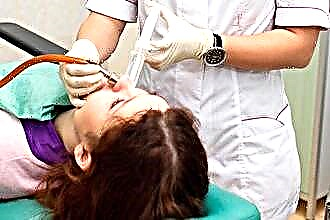The greatest danger to the fetus is represented by infectious diseases in the first trimester, however, in the long term, there is also a risk of premature birth due to pathology of the placenta, deterioration of the condition of the pregnant woman. Angina during pregnancy poses a threat to the health of a woman, a fetus. It can be caused by both the activity of pathogenic microorganisms and the intake of prohibited drugs.
 Depending on the form of tonsillitis, a different clinical picture is observed:
Depending on the form of tonsillitis, a different clinical picture is observed:
- The catarrhal form is manifested by moderate symptoms of intoxication, subfebrile hyperthermia, sore throat. At this stage, the doctor, when examining the throat, reveals redness, swelling, infiltration of the tonsils. With an early start of treatment, it is possible to avoid taking antibiotics, the progression of the disease. Symptoms regress after 3 days.
- Lacunar, follicular is characterized by more pronounced signs of intoxication, when the temperature reaches 39 degrees, intense pain in the throat, cephalalgia, joint aches, myalgia disturb. With pharyngoscopy, suppurating follicles in the form of grains are visualized, purulent discharge accumulates in the lacunae. A film appears on the surface of the tonsils.
- Ulcerative, necrotic forms are manifested by the formation of ulcerative defects on the tonsils, the appearance of a gray, dull plaque. If you try to remove the film yourself, an open wound remains. Necrosis subsequently spreads to the posterior pharyngeal wall, palatine arches. Fever reaches 40 degrees, there are difficulties in opening the mouth, intense sore throat, from which the woman refuses to eat, does not speak.
If a sore throat occurs, a pregnant woman should immediately start rinsing with antiseptic solutions, without waiting for the appearance of hyperthermia.
This will help to stop the spread of the infection, the inflammatory process, until a diagnosis is made.
Complications of angina for the fetus
Why is angina dangerous during pregnancy? The danger of sore throat lies in the high risk of penetration of an infectious agent into the general bloodstream, after which a septic condition develops, internal organs are affected.
 The period of febrile fever has a negative effect on the fetus due to the development of hypoxia. During a persistent rise in temperature, there is a failure in the synthesis of proteins, which are the "building blocks" for the body. In addition, hyperthermia leads to shortness of breath in a woman, large losses of fluid with sweat, breathing, slowing down of blood flow in the placenta, which leads to an increase in fetal hypoxia.
The period of febrile fever has a negative effect on the fetus due to the development of hypoxia. During a persistent rise in temperature, there is a failure in the synthesis of proteins, which are the "building blocks" for the body. In addition, hyperthermia leads to shortness of breath in a woman, large losses of fluid with sweat, breathing, slowing down of blood flow in the placenta, which leads to an increase in fetal hypoxia.- Formation of malformations.
- Freezing of the fetus.
- The threat of spontaneous abortion.
- Severe toxicosis.
Complications of sore throat for a pregnant woman
Improper untimely treatment of tonsillitis leads to the development of local, general complications. Depending on the level of immune defense, the disease can be complicated by the generalization of infection, damage to internal organs.
The most common complication is rheumatic fever. It develops as a result of immune dysfunction, when one's own tissues are perceived by the immune system as foreign. This is due to the fact that the complex of antigens in streptococcus is similar to the antigens of the cardiac muscle, kidneys, joints, so the immune system begins to synthesize antibodies against the pathogen and, accordingly, its tissues. As a result, a systemic pathological process is diagnosed with damage to many organs of autoimmune origin.
- The defeat of the myocardium is manifested in the form of valvular defects. In the presence of an inflammatory process, it is worth talking about myocarditis, in case of damage to the inner membrane, endocarditis develops, the outer membrane - pericarditis. Symptomatically, a woman is worried about angina pectoris spreading to the neck, arm, shortness of breath, fever. With the progression of the disease, heart failure is observed.
- Renal dysfunction in the form of glomerulonephritis, pyelonephritis. Of the clinical symptoms, there is pain in the area of the lumbar spine, swelling of the extremities, increased blood pressure, febrile hyperthermia.
 In urine tests, an increase in the level of erythrocytes, leukocytes, protein, and the appearance of bacteria are recorded.
In urine tests, an increase in the level of erythrocytes, leukocytes, protein, and the appearance of bacteria are recorded. - Joint damage (migratory arthritis). The inflammatory process is manifested by swelling of the tissues of the joints, pain, hyperemia of the skin over the joint, limitation of mobility.
- Sepsis.
Of the local complications, it should be noted:
- otitis media, which is manifested by soreness in the ear area, hearing impairment, hyperthermia;
- abscess, when the tonsil becomes edematous, tense, sharply painful;
- phlegmon is characterized by the spread of a purulent process to the surrounding tissues without clear outlines;
- laryngeal edema is a serious complication that requires immediate attention. With an increase in edema, breathing becomes difficult, which leads to hypoxia;
- bleeding from the vessels feeding the tonsils, which are melted by purulent masses with lacunar sore throat.
Dangers of antibiotic therapy to the fetus
In the treatment of tonsillitis, antibacterial agents are used to combat the pathogenic pathogen. The doctor prescribes drugs, taking into account the period, the peculiarities of the course of pregnancy, the presence of concomitant pathology. The advisability of using antibiotics is determined exclusively by the doctor. The actions of each group of drugs are aimed at combating a certain type of infectious microorganisms. Long-term antibiotic therapy can provoke many side effects that negatively affect the health of the fetus, the expectant mother.
It is also worth noting that antibiotics have a detrimental effect not only on pathogens, but also on beneficial microorganisms. As a result, the microflora suffers, the body's immune defense decreases. In addition, drugs increase the risk of dysfunction of internal organs (liver, kidneys, hearing).
Antibiotic therapy is especially dangerous in the 1st trimester, when the harm to the embryo reaches its maximum level. Toxic substances penetrate through the placental protection into the bloodstream of the fetus. The greatest harm is done to the organ that is at that time in the active stage of development. Often teeth, bone structures, heart, kidneys, hearing organs suffer from toxic effects.
Starting in the second half of pregnancy, the toxicity of drugs is not so aggressive for the embryo, however, caution in the choice of medication must be observed until the end of pregnancy.
The independent choice of an antibiotic leads to the emergence of resistance of infectious pathogens, the development of complications from the fetus.
Harm of antibiotics to the fetus
 Today there is a huge selection of antibacterial agents. This is necessary for the most accurate selection of medication against infectious pathogens, which allows you to achieve a positive result in a short time without a minimum number of side effects.
Today there is a huge selection of antibacterial agents. This is necessary for the most accurate selection of medication against infectious pathogens, which allows you to achieve a positive result in a short time without a minimum number of side effects.
Some antibiotics can have a detrimental effect on the embryo, so you should consult your doctor before starting antibiotics. Among the prohibited drugs, it is worth highlighting:
- Doxycycline, tetracycline, which easily penetrate the placenta, disrupt mineral metabolism, accumulate in tooth buds, bone structures, and affect the liver.
- Fluoroquinolones (norfloxacin, ciprofloxacin, ofloxacin) damage joints (cartilage and bone tissue) when penetrating to the embryo.
- Macrolides (clarithromycin, otherwise fromilide, klacid, roxithromycin) have a toxic effect on the fetus.
- Aminoglycosides (streptomycin, kanamycin, gentamicin) after passing the placental barrier have a damaging effect on the kidneys, the inner ear, which leads to the development of deafness.
- Chloramphenicol (synthomycin, chloramphenicol) quickly pass through the placenta, inhibits hematopoiesis, affects the bone marrow, disrupts the treatment of blood cells, especially in the second half of pregnancy.
- Co-trimoxazole (biseptol), when taken in high doses, penetrates the placental barrier, leading to the development of heart defects, mutations.
- Nitrofurans (furazolidone, furadonin) disrupt the formation of the urinary system in the embryo.
Of course, not all of the listed antibiotics are used to treat angina even outside the period of pregnancy, but a woman should be aware of the dangers of each drug and not take them on her own.
If a woman took illegal antibiotics during the "pregnant" period, when she did not yet know about bearing a fetus, this can lead to spontaneous abortion, pregnancy fading.
 It is especially dangerous to take antibiotics on the advice of friends who assure you of the effectiveness of the drug and the absence of adverse reactions during pregnancy.
It is especially dangerous to take antibiotics on the advice of friends who assure you of the effectiveness of the drug and the absence of adverse reactions during pregnancy.
As for the permitted antibiotic therapy, which is used for angina during pregnancy, it should be highlighted:
- The group of penicillins, which includes amoxiclav, amoxicillin, augmentin. Medicines do not have a negative effect on the embryo, they are well tolerated by a woman.
- Cephalosporins (cefepime, cephalexin, ceftriaxone) are prescribed quite widely in the presence of an allergy to penicillins, insensitivity of pathogenic pathogens to them. They do not have a toxic effect on the fetus.
- Macrolides (erythromycin, sumamed) in the minimum concentration penetrate the placental barrier, are not able to cause developmental abnormalities when taken for a short time. They are prescribed in case of ineffectiveness, suspicion of allergic reactions to penicillins, cephalosporins.
Treatment of angina during pregnancy
In addition to antibacterial agents for the treatment of tonsillitis, antiseptic agents are used in the form of rinsing solutions, spray, and lozenges.
- Miramistin, Chlorhexidine, Rotokan, Chlorophyllipt, Furacilin are well suited for preparing rinsing solutions. Thanks to the antimicrobial components, the fight against pathogenic microorganisms is carried out, without harm to the fetus. The procedure is repeated every 1.5-2 hours.
- Geksoral, Ingalipt, Tantum-Verde, Chlorfillipt are used in the form of a spray to irrigate the tonsils between rinses.
- Lizobakt, Faringosept in tablet form are used for resorption.
With hyperthermia above 37.5-38 degrees, it is necessary to take paracetamol-based antipyretics. Aspirin preparations are prohibited. However, it should be remembered that frequent use of Nurofen, paracetamol is also not desirable. It is recommended to use physical methods of cooling first (warm shower, drinking plenty of fluids, rubbing with a diluted vinegar solution).
In some sources, you can find recipes for traditional medicine based on herbs (infusions, decoctions for internal intake, rinsing), but you need to be careful.
 We focus on the fact that many herbs that are used in the treatment of tonsillitis are capable of affecting the hormonal level, the tone of the uterus, which threatens to terminate pregnancy.
We focus on the fact that many herbs that are used in the treatment of tonsillitis are capable of affecting the hormonal level, the tone of the uterus, which threatens to terminate pregnancy.
Also, any procedures using high temperatures are not recommended for a pregnant woman, for example, hot showers, foot baths, compresses. Bed rest, plentiful warm drinks and proper nutrition with the exception of spicy, hard, hot dishes are especially important in the acute period of the disease. To prevent dehydration, accelerate the elimination of toxins from the body, fruit drinks, compotes, jelly are perfect.
We have analyzed in detail why angina is dangerous during pregnancy - the influence and consequences for the fetus, now the woman's task is to follow the recommendations and regularly visit the doctor for preventive examinations. This will help control the course of pregnancy and give birth to a healthy baby.

 The period of febrile fever has a negative effect on the fetus due to the development of hypoxia. During a persistent rise in temperature, there is a failure in the synthesis of proteins, which are the "building blocks" for the body. In addition, hyperthermia leads to shortness of breath in a woman, large losses of fluid with sweat, breathing, slowing down of blood flow in the placenta, which leads to an increase in fetal hypoxia.
The period of febrile fever has a negative effect on the fetus due to the development of hypoxia. During a persistent rise in temperature, there is a failure in the synthesis of proteins, which are the "building blocks" for the body. In addition, hyperthermia leads to shortness of breath in a woman, large losses of fluid with sweat, breathing, slowing down of blood flow in the placenta, which leads to an increase in fetal hypoxia. In urine tests, an increase in the level of erythrocytes, leukocytes, protein, and the appearance of bacteria are recorded.
In urine tests, an increase in the level of erythrocytes, leukocytes, protein, and the appearance of bacteria are recorded.

